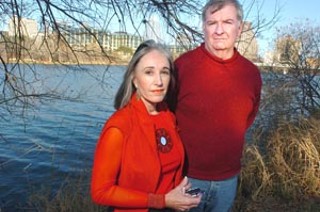The Moriarty File
What's that smell?
By Kimberly Reeves, Fri., Jan. 20, 2006

Bill Moriarty, fired from his role as program manager of the Austin Clean Water Program, has sued city leaders, claiming that City Manager Toby Futrell, Council Member Brewster McCracken, and Assistant Manager Joe Canales had precipitated his dismissal and defamed his character.
The lawsuit, filed Dec. 28, asks for an award of $1.3 million, and offers a window into both substantial contract work with the city and the inner workings of the ACWP, a previously low-profile program best known to the Water & Wastewater Commission and few others. ACWP sounds vaguely like an anti-pollution effort, and it is one, but of a very traditional sort; it's a $200 million set of water projects to stop overflow of the city's sanitary sewer lines during and after rainstorms. Those overflows are common to urban areas, have made periodic local headlines and occasional neighborhood stomach aches (and official headaches), and can be major pollution violations by the standards of the Environmental Protection Agency. Only a decade ago, Houston spent $1 billion to correct overflow problems in its system.
The EPA cited Austin for its overflow issues in 2001. To address the problem, the city awarded the environmental engineering firm Earth Tech the contract to oversee the 120 projects under the ACWP program. Moriarty was Earth Tech's program manager; his eventual departure from the project is outlined in a series of memoranda and Moriarty's own lawsuit. Moriarty might have simply been a footnote in Austin city politics had Brewster McCracken not leaked a city attorney memorandum to the Austin American-Statesman, an action McCracken defends as simply revealing the results of a taxpayer-paid investigation.
The backstory of Moriarty's downfall began as early as December 2004, when two members of local engineering firms approached the city and alleged that Moriarty had asked for kick-backs in order to "open some doors" and "grease some wheels" for work in the ACWP program. According to a police summary, they further charged that Espey Consulting was receiving preferential treatment over other firms when it came time to award contracts under ACWP. An investigation by the Austin Police Department's Integrity Crimes Unit, however, could find no tangible evidence that Espey got any more contracts than anyone else. As a memo from Sgt. Mark Spangler noted, "It is highly probable that Earth Tech is doing their job of managing the ACWP program per their agreement and that the changing of contractors/engineers [is] completely under their purview."
That was it for about four months, until new accusations popped up, this time from former mayor and current lobbyist Bruce Todd. Todd – whose clients include the engineering firm Malcolm Pirnie – offered new allegations to District Attorney Ronnie Earle, saying Moriarty had made improper financial demands on engineering firms, specifically CH2M-Hill. An investigation of this charge also failed to yield tangible evidence of wrongdoing, although CH2M-Hill confirmed that Moriarty had demanded better financial compensation for Earth Tech, but continued to work with the firm after they refused the request.
Moriarty denies the charges of any kickbacks or demands for same. In his initial petition for the lawsuit, Moriarty's attorney Michael Shaunessy noted that the two firms making the original bribery allegations faced their "crisis of conscience" a full two years after the alleged meetings with Moriarty, and that an investigation had proven those charges false. Shaunessy conjectures that the bribery allegations, as well as the final charge that would bring Moriarty down, were concocted by a group of disgruntled engineering firms wanting more city contracts.
According to the city, the blow leading finally to Moriarty's dismissal was evidence that he had a hand in awarding a contract for the ACWP Web site design early last year to his girlfriend Diane Hyatt of Diane Hyatt Associates. While city officials could find no evidence of bribes, they found what they charge was an apparent conflict of interest, and they asked Earth Tech to remove Moriarty as ACWP program manager.
Moriarty's lawsuit against the city officials vigorously denies any bribes or kickbacks and defends his record as a good steward of the city program. Moriarty also counter-claims, at considerable length, that city officials have been negligent in their attention to serious wastewater problems. Regarding the city's specific charge against him, Moriarty maintains that he presented Hyatt as a candidate on the city's approved contract rotation list. Yes, the Web site project was not competitively bid, but that was because the city had set such an early deadline for its completion. Moreover, Moriarty argues, it was the city of Austin, not he, who signed the final contract with Hyatt after reviewing her qualifications and work product, and the city raised no objections about the quality of Hyatt's work.
Anne Morgan, chief of the city's litigation division, says the question was not Hyatt's qualifications or the quality of her work. It was the fact that Hyatt derived most of her firm's income – reportedly 75% – from five contracts with the ACWP. Because of her relationship with Moriarty, that's a conflict of interest, Morgan says. All five of those contracts also are tied to Espey Consulting.
Futrell is the main target of Moriarty's lawsuit. It claims that Futrell was "swayed by the political influence the engineering firms had purchased through their lobbyists" and agreed to work with the firms toward Moriarty's removal as program manager. Instead of following city protocol by retaining the city auditor's office, Futrell retained the private law firm of Cornell, Smith & Mierl, LLP to conduct an investigation into the allegations against Moriarty. "This external investigation would cost the City tens of thousands of dollars and would be anything but fair and impartial," reads the petition. "[T]he City Manager placed pressure on Cornell and her law firm to focus her investigation on interviews with persons who have a vested interest in Moriarty's removal and/or had previously indicated hostility toward Moriarty."
Although that $1.3 million claim is daunting, Shaunessy says what Moriarty primarily wants is a hearing before City Council to clear his name. Morgan responds that Moriarty's removal as program manager is a matter between him and Earth Tech, which made the actual decision to remove him. Morgan says the city has yet to be formally served with Moriarty's lawsuit. Attorney Shaunessy said Tuesday that the original petition has since been amended with additional information concerning the city's wastewater management; once served, the city will have 20 days to respond.
Got something to say on the subject? Send a letter to the editor.








